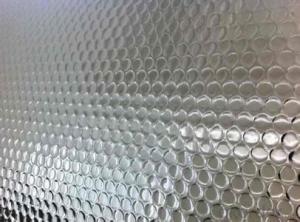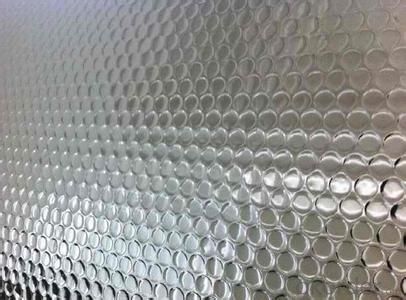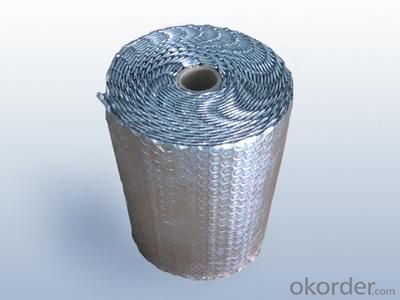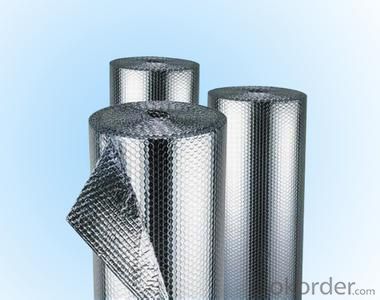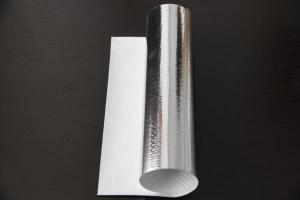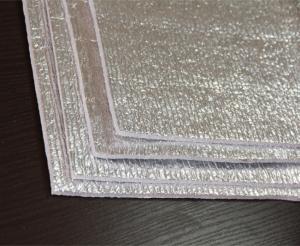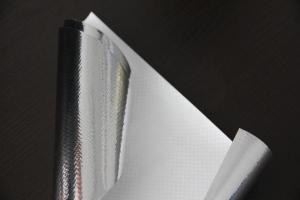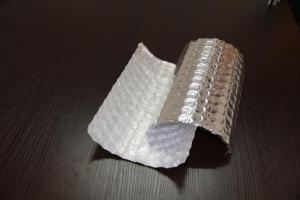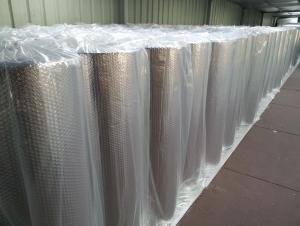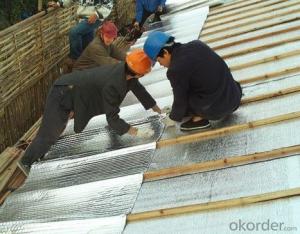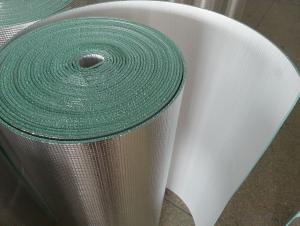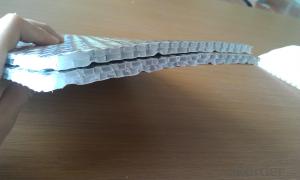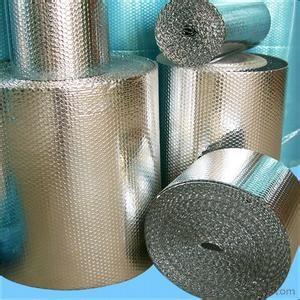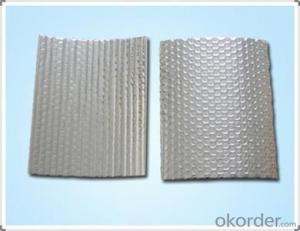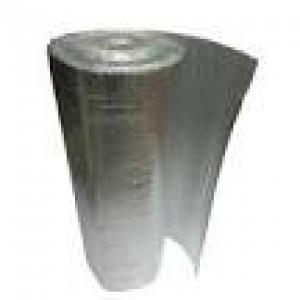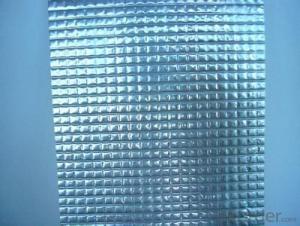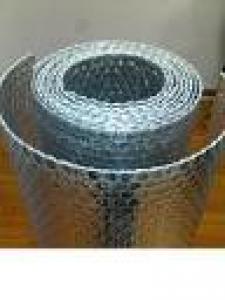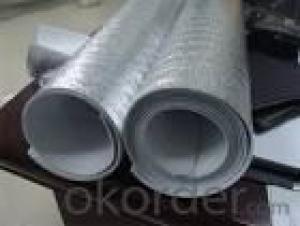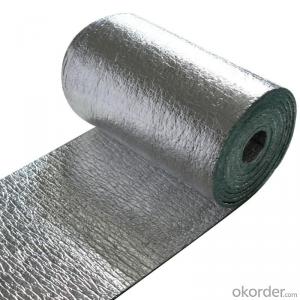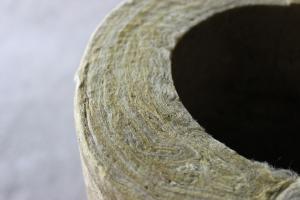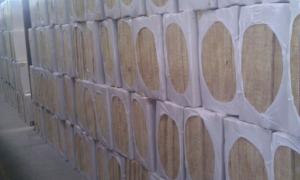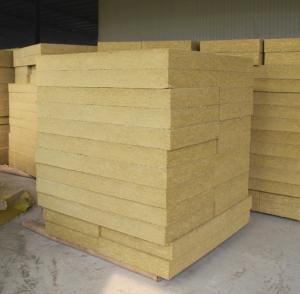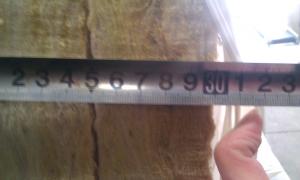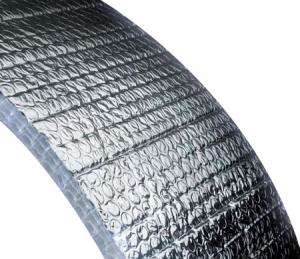Roofing Insulation Adhesive - Aluminum Foil Coated Bubble Insulation Type 5
- Loading Port:
- Shanghai
- Payment Terms:
- TT OR LC
- Min Order Qty:
- 10000 m²
- Supply Capability:
- 100000 m²/month
OKorder Service Pledge
OKorder Financial Service
You Might Also Like
Bubble Insulation Benefits:
Reflects 96% of radiant heat
Non-toxic / Non-carcinogenic
Does not require protective clothing or respirators to install
Durable and lightweight
Does not compress, collapse or disintegrate
Vapor and radon retarder
Easy to cut and install
Permanent and maintenance-free
Does not provide a growth medium or nutritive value for fungus, insects, or rodents
Does not support the growth of mold or mildew
Not affected by moisture or humidity
Lowers heating and cooling costs year round
Bubble Foil Application:
Metal & Steel Buildings
Homes
Roof Underlayments
Cathedral Ceilings
Crawl Spaces
Hot Water Heaters
Basement Walls
Floors
Garage Doors
Concrete slabs
Driveway snow melts
Pole barns
Post frame buildings
Poultry barns
Animal kennels
Temperature sensitive storage areas
Air Bubble Foil Insulation Tech Data:
Material Structure: AL/Bubble/AL | ||
Bubble Size:D10mm*H 4mm(10*2.5/10*4/10*6/20*7/25*10)choose the bubble size | ||
Bubble Weight:0.13kg/m2 ( can be customized ) | ||
Roll Width:1.2m (lenth can be customized) | ||
PROPERTIES | TEST DATA | UNIT |
Thickness | 3.5-4 | mm |
Weight | 250 | g/m2 |
Emissivity | 0.03-0.04 | COEF |
Thermal conductivity | 0.034 | w/m0 |
Apparent Density | 85 | kg/m3 |
Reflectivity | 95-96 | % |
Water Vapour Transmission | 0.013 | g/m2kpa |
Corrosion | doesn't generate | |
Tensile Strength(MD) | 16.98 | Mpa |
Tensile Strength(TD) | 16.5 | Mpa |
- Q: do I have to blow insulation in the roof of my mobile home if I install foam insulation under a meatle roof?
- I don't think you can blow insulation in that area. It is to small of an area to get insulation into.
- Q: Should a two story home have insulation under the roof in the big closets ?
- yea. it might cost you some to put it in but it will save you a lot in the future with heating and air conditioning bills
- Q: I have a converted loft which is really cold. The roof doesn't have any insulation, just a waterproof sheet, but i don't want to spend too much insulating it with the proper boards. If i use mineral wool and staple it across the roof trusses will it do a good job?
- Yes, be sure to leave an air space between the top of the insulation and the roof deck to allow for ventilation, and use a vapor barrier on the interior side of the insulation.
- Q: please help..
- too add to that housing insulation wouldnt help you with dampening it would make it worse by absorbing the sound, try talking through a pillow for example/
- Q: do i leave air gap in attic roof for insulation?
- The best way to set up an attic is to put a vapor barrier under the rafters (before nailing on the gyproc), then put the insulation (fibreglas batts) between the rafters to full depth (10 or 12 inches). Soffit vents are installed under the eaves at the sides of the roof, and gable vents are placed near the peak of the roof at the ends. This allows for airflow resulting from convection, particularly important in the summer months to remove heat buildup in the attic. If the insulation is adequate, it will not only isolate this heat buildup from the inside of the house in summer, but will prevent heat loss to the attic in winter. (The airflow in winter will be minimal, but will remove any moisture/condensation that might collect otherwise.)
- Q: I am building a porch roof over an existing patio. The rafters are fabricated I-beams. I plan on putting aluminum soffit under the I-beams. On top of the roof I would like to put down a metal roof. I already put down 3/4" OSB and a rain/ice barrier. Do I need insulation and/or ventilation on top of the rain and ice barrier, or can I get away without it?
- Its a outside patio, are you going to enclose it for living space? If not don't bother to insulate and for ventilation there is soffit that comes with vent holes in it. Add; no it will not cause a moisture problem, i had a patio with a open bottom metal roof and had no problems and i live in Florida.
- Q: is it safe to put insulation in the corners where the roof meets the wall in attics?fiberglass in corners?
- No it is not EVER safe! Roofing material needs to breathe. Anywhere that insulation is applied to the underside of the roof deck the roofing material will warp and then leak. You have to have a cushion of air between the underside of the decking and the insulation
- Q: hot because of all the added insulation. Is that what the insulation will do? Someone told me that it will save us on our cooling/heating bills, and that it will be warmer in the winter and cooler in the summer now. Is this true?
- Very humorous!!! you be attentive to final evening I had a dream that i became eating a significant marshmallow, as quickly as I awakened this morning my pillow became long previous! Ha Ha Ha the previous ones are the ultimate....
- Q: I am purchasing a mobile home with a shingled roof. The shingles need to be replaced (>15yrs old) and with the cost of heating going up each day I thought I would added some of that 2" thick rigid insulation. I would place this right on top of the existing roof and then place the firring strips for the metal roof right on top of the rigid insulation panels (which are 4x8'). By using 3" galvanized sheet rock screws I will get a good solid attachment. Then I will put the metal roofing on to the firring strips as normal. Does anyone see any downside to doing this? Has anyone tried this before?
- I agree with the soundness of every part of your plan EXCEPT not removing the original shingle roof. The shingle roof is already at the end of its usable life. There’s no benefit to covering up old problems, and they will most likely affect the durability of the new roof. Plus, removing the old roof gives you the opportunity to inspect and repair any issues with the roofing deck. Your new insulation and metal roof will attach better and perform better by removing the old shingle roof.
- Q: The attic was converted into two rooms and I want to add insulation but the space between the ceiling of the rooms and the roof is about 5 inches? How should I do this?
- There are closed-cell expanding foam insulation materials that can be installed through rather small holes in the ceiling. The advantage of this material is that it also serves as a vapor-barrier - a critical function in your case. Not cheap, but very effective. Make sure you install roof vents to prevent excessive heat from developing above the insulation - but with foam, this requirement is far less onerous than with blown in or batt insulation.
Send your message to us
Roofing Insulation Adhesive - Aluminum Foil Coated Bubble Insulation Type 5
- Loading Port:
- Shanghai
- Payment Terms:
- TT OR LC
- Min Order Qty:
- 10000 m²
- Supply Capability:
- 100000 m²/month
OKorder Service Pledge
OKorder Financial Service
Similar products
Hot products
Hot Searches
Related keywords
